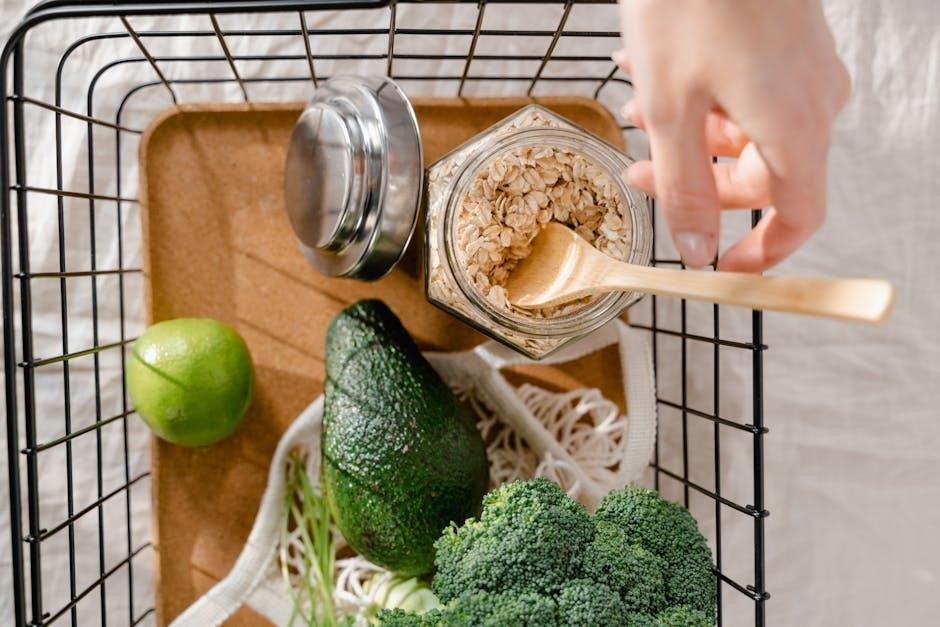This 4-week plan focuses on anti-inflammatory foods to help manage endometriosis symptoms naturally. By incorporating omega-3 rich foods, antioxidants, and fiber, women can reduce inflammation and improve well-being.
Understanding Endometriosis and Its Impact on Health
Endometriosis is a chronic condition where tissue similar to the lining of the uterus grows outside the uterus, causing internal bleeding, inflammation, and scarring. This misplaced tissue has no way to exit the body, leading to symptoms like pelvic pain, heavy bleeding, and infertility. The condition can also affect bowel and bladder function, significantly impacting quality of life. Inflammation plays a central role in worsening symptoms, making it a key target for management strategies. Understanding the condition’s mechanisms is essential for developing effective treatment plans, including dietary changes that aim to reduce inflammation and alleviate discomfort.
The Role of Nutrition in Managing Endometriosis Symptoms
Nutrition plays a cornerstone role in managing endometriosis symptoms by addressing inflammation and hormonal balance. Certain foods can trigger or reduce inflammation, which is central to the condition’s progression. While diet alone cannot cure endometriosis, studies suggest that anti-inflammatory eating plans may alleviate symptoms like pain and bloating. By focusing on nutrient-dense, anti-inflammatory foods, women can create an environment that supports healing and reduces discomfort. This approach, combined with medical treatments, offers a holistic strategy to improve quality of life and manage the condition effectively.
Understanding the Link Between Diet and Endometriosis
Diet significantly influences endometriosis progression by reducing inflammation and alleviating symptoms. Anti-inflammatory foods help minimize discomfort, while certain triggers can worsen the condition, making nutrition a key factor.
How Inflammation Contributes to Endometriosis Symptoms
Inflammation plays a central role in exacerbating endometriosis symptoms. The immune system’s response to endometrial tissue outside the uterus triggers the release of inflammatory markers, leading to pain and discomfort. Chronic inflammation can cause the formation of scar tissue and adhesions, further complicating the condition. This inflammatory cycle often results in heavy bleeding, pelvic pain, and fertility issues. By addressing inflammation through dietary changes, women can potentially reduce the severity of these symptoms and improve their quality of life.
The Science Behind Anti-Inflammatory Diets
Anti-inflammatory diets focus on reducing chronic inflammation, a key contributor to endometriosis symptoms. Certain foods, such as omega-3 fatty acids and antioxidants, help modulate the immune system and lower inflammatory markers. These nutrients inhibit the production of pro-inflammatory prostaglandins and cytokines, which exacerbate pain and tissue damage. By incorporating anti-inflammatory foods and avoiding pro-inflammatory ones, individuals can create a biochemical environment that reduces endometriosis-related inflammation. This approach not only alleviates symptoms but also supports long-term health by addressing the root causes of inflammation.

Key Foods to Include in Your 4-Week Diet Plan
Focus on omega-3 rich foods, antioxidants, whole grains, and fiber to reduce inflammation and regulate hormones, supporting overall endometriosis management.
Omega-3 Rich Foods for Reducing Inflammation
Incorporate fatty fish like salmon, mackerel, and sardines, as well as flaxseeds and walnuts, to boost omega-3 intake. These foods help reduce inflammation, a key contributor to endometriosis symptoms, by balancing prostaglandins and promoting healing. Regular consumption can lead to noticeable improvements in pain levels and overall well-being. Aim to include omega-3 sources in at least two meals per week for optimal benefits. These foods not only support symptom relief but also contribute to a balanced and nutritious diet.
Antioxidant-Packed Fruits and Vegetables
Antioxidant-rich foods play a crucial role in reducing oxidative stress, which can exacerbate endometriosis symptoms. Include a variety of colorful fruits and vegetables like berries, leafy greens, and bell peppers, which are high in vitamins C and E, as well as polyphenols. These nutrients help combat free radicals, reducing inflammation and promoting healing. Berries such as blueberries and raspberries are particularly beneficial, while spinach and kale provide essential antioxidants. Incorporating these foods into your meals and snacks can help mitigate pain and improve overall well-being during the 4-week plan.
Whole Grains and Fiber-Rich Foods
Whole grains and fiber-rich foods are essential for regulating digestion and hormone balance, which can help alleviate endometriosis symptoms. Incorporate whole grains like quinoa, brown rice, and oats, as well as fiber-rich vegetables such as broccoli, carrots, and Brussels sprouts. Legumes, including lentils and chickpeas, are also excellent sources of fiber. A high-fiber diet promotes the excretion of excess estrogen, reducing its potential to worsen endometriosis. Additionally, fiber supports gut health, which is closely linked to overall inflammation levels. Aim to include a variety of these foods in your meals to enhance nutrient absorption and support symptom relief.
Foods to Avoid During the 4-Week Plan
Eliminate processed foods, red meat, and dairy to reduce inflammation and hormonal triggers. These foods can exacerbate endometriosis symptoms and hinder progress.
Processed Foods and Their Impact on Inflammation
Processed foods are high in unhealthy additives, sugars, and saturated fats, which can trigger inflammation and worsen endometriosis symptoms. These foods often contain advanced glycation end (AGE) products, which promote oxidative stress and inflammation in the body. Regular consumption of processed foods like sugary snacks, refined carbohydrates, and fried foods can lead to chronic inflammation, exacerbating endometriosis-related pain and discomfort. Additionally, processed foods often lack essential nutrients and fiber, disrupting gut health, which plays a critical role in managing endometriosis. Eliminating these foods is a key step in reducing inflammation and supporting overall well-being during the 4-week plan.
Dairy Products and Potential Hormonal Triggers
Dairy products, particularly those high in saturated fats and lactose, may contribute to hormonal imbalances and inflammation in women with endometriosis. Estrogen is known to fuel endometriosis growth, and some dairy products contain estrogen-like compounds or growth hormones, which could exacerbate symptoms. Additionally, lactose intolerance or sensitivity to casein, a protein in dairy, can trigger inflammation. While not all women react negatively to dairy, reducing or avoiding processed dairy products, such as cheese and whole milk, is often recommended during the 4-week plan to minimize potential hormonal triggers and inflammation; Opting for plant-based alternatives like almond or oat milk may be beneficial.
Red Meat and Saturated Fats
Red meat and saturated fats can increase inflammation, worsening endometriosis symptoms. These foods promote prostaglandins, which enhance pain and inflammation. Limiting red meat and opting for lean proteins like poultry or plant-based options reduces estrogen levels and inflammation, offering a better quality of life. Regular consumption of red meat is linked to higher estrogen levels, which can fuel endometrial growth; Incorporating anti-inflammatory fats like Omega-3s from fish helps counteract these effects, supporting overall endometriosis management and improving symptoms effectively.

Creating a Balanced 4-Week Meal Plan
A well-structured 4-week meal plan focuses on anti-inflammatory foods, omega-3 sources, and antioxidants to reduce endometriosis symptoms. It emphasizes whole grains, fruits, and vegetables for optimal nutrition and wellness.
Week 1 focuses on transitioning to an anti-inflammatory diet by incorporating omega-3 rich foods, antioxidants, and fiber. Start with fatty fish like salmon, leafy greens, and whole grains to reduce inflammation. Avoid processed foods, red meat, and dairy to minimize hormonal triggers. Hydration is key, so drink plenty of water and consider herbal teas. Portion control and mindful eating are introduced to establish a balanced routine. This week sets the foundation for the plan, helping the body adapt to nutrient-dense meals that support symptom relief. Consistency is crucial for long-term benefits, so stick to the plan diligently.
Week 2: Incorporating Nutrient-Dense Recipes
Week 2 introduces a variety of nutrient-dense recipes to enhance anti-inflammatory benefits. Focus on incorporating antioxidant-rich foods like berries, sweet potatoes, and spinach, along with omega-3 sources such as fatty fish and flaxseeds. Whole grains, legumes, and fiber-rich vegetables are also emphasized to support digestion and hormonal balance. Recipes are designed to be flavorful and satisfying, using herbs and spices for seasoning instead of salt or sugar. This week encourages meal prepping to maintain consistency and explores healthy snacking options to curb cravings. The goal is to further reduce inflammation while providing the body with essential nutrients for healing and energy.
Week 3: Managing Cravings and Portion Control
Week 3 focuses on strategies to manage cravings and practice portion control. By identifying triggers, you can develop healthier habits to avoid overeating or reaching for inflammatory foods. Incorporate satisfying snacks like fresh fruits, nuts, and veggie sticks to curb cravings. Portion control is emphasized through mindful eating and using smaller plates. Balanced meals with protein, healthy fats, and complex carbs help maintain satiety. This week also introduces techniques like meal prepping and gradual portion reduction to make sustainable changes without feeling deprived. The goal is to build a healthier relationship with food while maintaining nutrient density.
Week 4: Sustaining Healthy Eating Habits
Week 4 focuses on maintaining the progress made and turning healthy eating into a long-term lifestyle. Emphasize consistency by continuing to prioritize anti-inflammatory foods and avoiding triggers. Introduce new recipes to keep meals exciting and prevent boredom. Encourage mindful eating and self-compassion when slip-ups occur. Celebrate small victories and track progress to stay motivated. Focus on building a support system, such as sharing meals with others or joining a community, to help sustain habits. The goal is to create a sustainable routine that promotes overall well-being and reduces endometriosis symptoms long-term.

The Importance of Hydration and Supplements
Hydration and supplements, like omega-3s and antioxidants, are essential for reducing inflammation, alleviating endometriosis symptoms, and promoting overall well-being during the plan.
Hydration Tips for Reducing Symptom Severity
Staying hydrated is crucial for reducing endometriosis symptom severity. Aim to drink 8-10 glasses of water daily to flush toxins and support hormonal balance. Incorporate herbal teas like chamomile, which may soothe inflammation. Avoid sugary drinks that can exacerbate inflammation. Consider adding lemon to water for detoxification. Tracking your water intake can help maintain consistency. Dehydration can worsen symptoms, so carrying a reusable water bottle is a helpful reminder. Proper hydration supports overall health and complements the anti-inflammatory diet, aiding in managing endometriosis effectively.
Supplements That Support Endometriosis Management
Certain supplements can complement your diet and help alleviate endometriosis symptoms. Omega-3 fatty acids, found in fish oil, reduce inflammation. Turmeric contains curcumin, a potent anti-inflammatory compound. Probiotics support gut health, which is linked to inflammation reduction. Magnesium may ease cramps, while vitamin D has anti-inflammatory properties. Some women benefit from vitamin E for antioxidant support. Always consult a healthcare provider before starting supplements to ensure they align with your health needs and won’t interact with medications. These natural additions can enhance your 4-week plan’s effectiveness in managing symptoms and improving overall well-being.

Lifestyle Changes to Complement Your Diet
Adopting healthy lifestyle habits enhances the effectiveness of your 4-week plan. Regular exercise, stress management, and adequate sleep improve overall well-being and reduce endometriosis symptoms.
Exercise Routines That Support Endometriosis Health
Regular physical activity can significantly alleviate endometriosis symptoms. Low-impact exercises like yoga, swimming, and brisk walking improve circulation and reduce inflammation. Strengthening core muscles through Pilates can enhance pelvic stability. Additionally, aerobic exercises such as cycling or dancing boost endorphins, which act as natural painkillers. It’s important to choose routines that are gentle on the body and avoid high-intensity workouts that may exacerbate symptoms. Consistency is key, aiming for at least 30 minutes of moderate exercise most days of the week. Always consult a healthcare provider before starting any new fitness program.
Stress Management Techniques for Symptom Relief
Chronic stress can worsen endometriosis symptoms by increasing inflammation and pain sensitivity. Effective stress management techniques include mindfulness meditation, deep breathing exercises, and yoga, which help regulate hormones and reduce tension. Engaging in relaxing activities like reading, journaling, or spending time in nature can also alleviate stress. Prioritizing sleep and setting boundaries to maintain a healthy work-life balance are essential. Even short periods of relaxation, such as a warm bath or a calming walk, can make a significant difference. Consistency in these practices is key to managing stress and supporting overall well-being during the 4-week plan.
Success Stories and Community Support
Many women have found relief through the 4-week plan, sharing their journeys and inspiring others. Support groups and online communities provide emotional backing and practical advice, fostering motivation and connection.
Real-Life Experiences with the 4-Week Diet Plan
Women who followed the 4-week plan reported significant reductions in inflammation and pain. Many shared stories of improved energy levels and reduced menstrual discomfort. One participant noted, “This plan transformed my cycle.” Others highlighted the emotional support from online communities, which kept them motivated. The structured approach helped them stay consistent, while the focus on nutrient-dense meals made the transition to healthier eating feel achievable. These real-life successes demonstrate how dietary changes can empower women to take control of their endometriosis symptoms and improve their overall well-being.
Building a Supportive Community for Endometriosis
A supportive community plays a vital role in helping women manage endometriosis. Sharing experiences, tips, and encouragement fosters a sense of belonging and reduces feelings of isolation. Online forums, social media groups, and local support groups provide platforms for connection. Many women find inspiration in hearing success stories from others who have followed the 4-week diet plan. These communities also offer practical advice, such as meal ideas and stress management techniques. Building a network of understanding individuals can empower women to stay committed to their health journey and embrace lifestyle changes with confidence and motivation.

Common Mistakes to Avoid During the Plan
One common mistake is over-restricting calorie intake, which can lead to fatigue and decreased motivation. Another error is not gradually introducing new foods, potentially causing digestive discomfort. Additionally, some individuals overlook the importance of hydration, which is crucial for reducing inflammation. Relying too heavily on supplements without focusing on whole foods is another pitfall. It’s also important to avoid unrealistic expectations and instead focus on sustainable, gradual changes. Skipping meals or neglecting portion control can disrupt progress, emphasizing the need for a balanced and consistent approach throughout the 4-week plan.

Next Steps After Completing the 4-Week Plan
After finishing the 4-week plan, focus on maintaining healthy habits by gradually introducing new foods while monitoring symptoms. Consider incorporating intermittent fasting or continuing with anti-inflammatory recipes. Regular physical activity, such as yoga or swimming, can further support symptom management. It’s important to schedule follow-up appointments with your healthcare provider to assess progress and adjust the plan as needed. Additionally, exploring stress management techniques like meditation or acupuncture may enhance overall well-being. Staying connected with support groups can provide motivation and practical advice for long-term success in managing endometriosis through nutrition and lifestyle changes.
Adopting the 4-week endometriosis diet plan can significantly improve symptoms and quality of life. By focusing on anti-inflammatory foods, staying hydrated, and avoiding triggers, women can reduce pain and inflammation. Consistency and gradual lifestyle changes are key to long-term success. Remember, this plan is a foundation, and personalized adjustments may be necessary. With dedication and the right approach, managing endometriosis through nutrition becomes achievable, empowering women to take control of their health and well-being. Continue to seek support and stay informed to maintain progress and foster a healthier future.

Additional Resources for Endometriosis Management
For further guidance, explore books like Heal Endometriosis Naturally and the Endometriosis Nutrition Guide, which offer detailed meal plans and recipes. Online communities, such as Endometriosis Association forums, provide support and shared experiences. Websites like Endometriosis.net and health blogs often feature expert advice and testimonials. Additionally, consult with a nutritionist or healthcare provider to tailor the plan to your needs. These resources complement the 4-week diet plan, offering ongoing support and education for managing endometriosis effectively.